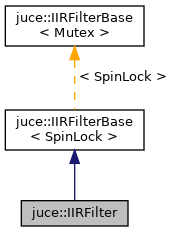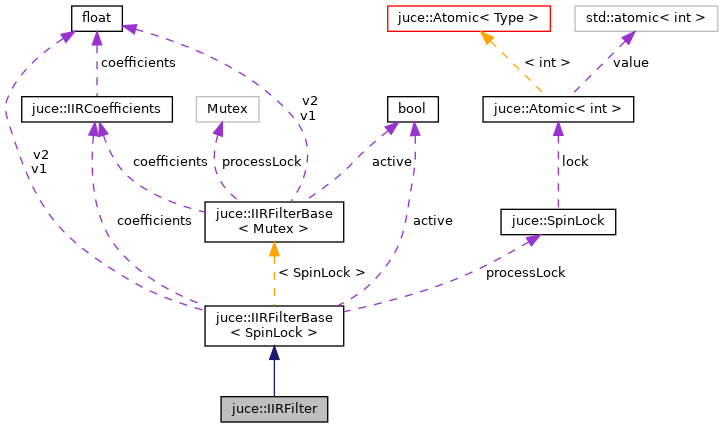An IIR filter that can perform low, high, or band-pass filtering on an audio signal, and which attempts to implement basic thread-safety. More...
#include <juce_IIRFilter.h>


Public Member Functions | |
| IIRCoefficients | getCoefficients () const noexcept |
| Returns the coefficients that this filter is using. More... | |
| IIRFilterBase () noexcept | |
| Creates a filter. More... | |
| IIRFilterBase (const IIRFilterBase &) noexcept | |
| Creates a copy of another filter. More... | |
| void | makeInactive () noexcept |
| Clears the filter so that any incoming data passes through unchanged. More... | |
| void | processSamples (float *samples, int numSamples) noexcept |
| Performs the filter operation on the given set of samples. More... | |
| float | processSingleSampleRaw (float sample) noexcept |
| Processes a single sample, without any locking or checking. More... | |
| void | reset () noexcept |
| Resets the filter's processing pipeline, ready to start a new stream of data. More... | |
| void | setCoefficients (const IIRCoefficients &newCoefficients) noexcept |
| Applies a set of coefficients to this filter. More... | |
Protected Attributes | |
| bool | active |
| IIRCoefficients | coefficients |
| SpinLock | processLock |
| float | v1 |
| float | v2 |
An IIR filter that can perform low, high, or band-pass filtering on an audio signal, and which attempts to implement basic thread-safety.
This class synchronises calls to some of its member functions, making it safe (although not necessarily real-time-safe) to reset the filter or apply new coefficients while the filter is processing on another thread. In most cases this style of internal locking should not be used, and you should attempt to provide thread-safety at a higher level in your program. If you can guarantee that calls to the filter will be synchronised externally, you could consider switching to SingleThreadedIIRFilter instead.
@tags{Audio}
|
inlinenoexceptinherited |
Returns the coefficients that this filter is using.
|
noexcept |
Creates a filter.
Initially the filter is inactive, so will have no effect on samples that you process with it. Use the setCoefficients() method to turn it into the type of filter needed.
|
noexcept |
Creates a copy of another filter.
|
noexceptinherited |
Clears the filter so that any incoming data passes through unchanged.
|
noexceptinherited |
Performs the filter operation on the given set of samples.
|
noexceptinherited |
Processes a single sample, without any locking or checking.
Use this if you need fast processing of a single value, but be aware that this isn't thread-safe in the way that processSamples() is.
|
noexceptinherited |
Resets the filter's processing pipeline, ready to start a new stream of data.
Note that this clears the processing state, but the type of filter and its coefficients aren't changed. To put a filter into an inactive state, use the makeInactive() method.
|
noexceptinherited |
Applies a set of coefficients to this filter.
|
protectedinherited |
|
protectedinherited |
|
protectedinherited |
|
protectedinherited |
|
protectedinherited |